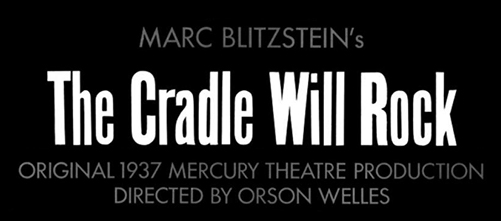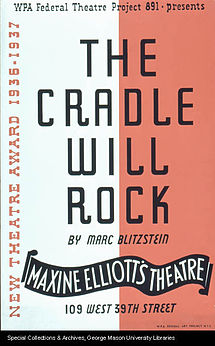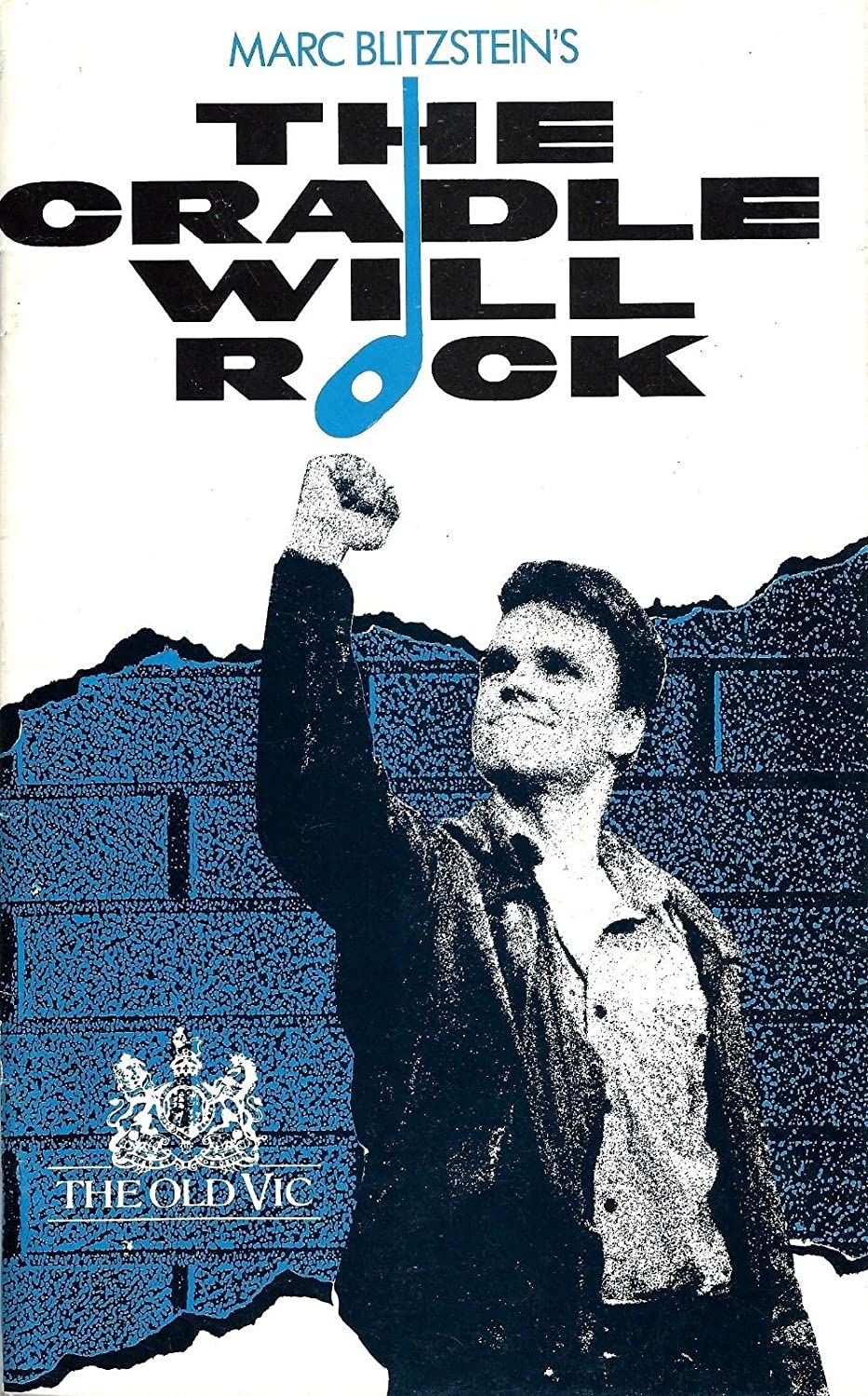
The Cradle Will Rock is a 1937 play in music by Marc Blitzstein. Originally a part of the Federal Theatre Project, it was directed by Orson Welles and produced by John Houseman. A Brechtian allegory of corruption and corporate greed, it includes a panoply of societal figures.
Setting: Steeltown, U.S.A.
Act I
Moll, a young prostitute, is thrown in jail when she refuses to accept money from a corrupt policeman. She is soon joined by the leaders of the Liberty Committee, an anti-union group mistakenly charged with pro-union activities. While the committee members call out for their patron, industrialist Mr. Mister, to free them, a vagrant named Harry Druggist befriends Moll and explains that he lost his business because of Mr. Mister.
Harry then reveals how Mr. Mister came to dominate Steeltown: Years earlier, during World War I, Mr. Mister's wife pays the town priest, Reverend Salvation, to preach sermons supporting her husband's interests. Editor Daily, the head of the local newspaper, begins running articles attacking the steelworker's union and its leader, Larry Foreman, while also hiring the inept Junior Mister as a foreign correspondent. Gus Polack, a newly elected member of the union, is killed in a car bombing that also kills his wife and Harry's son Stevie. Harry is pressured to keep quiet and subsequently loses his business permit, falling into absolute despair.
Act II
Eventually, all of Steeltown's prominent citizens join the Liberty Committee, including Salvation, Daily, the painter Dauber, and the violinist Yasha. With their support, Mr. Mister's rule over the town is seemingly unshakeable.
Later that night, Larry is arrested and beaten for distributing leaflets. He urges the others to join him and rise against Mr. Mister, saying that, in time, "the cradle will rock".
A flashback shows Mr. Mister persuading President Prexy of Steeltown University to threaten students with expulsion if they do not join the army. Dr. Specialist, the chairman of the Liberty Committee, is told to cover up the death of a steelworker by writing it off as a drunken accident. He does so even when the worker's sister, Ella Hammer, confronts him knowing the truth.
Later that evening, Mr. Mister arrives and bails out the committee members. He offers to pay off Foreman, but he refuses. As the committee jeers him, he defiantly declares that Mr. Mister's power over Steeltown will soon come to an end as the curtain falls.
The WPA (Works Progress Administration) temporarily shut down the project a few days before it was to open on Broadway. To avoid government and union restrictions, the show was performed on June 16, 1937 with Blitzstein playing piano onstage and the cast members singing their parts from the audience.
Federal Theatre Project
A production of the Federal Theatre Project, The Cradle Will Rock was to begin previews on Broadway June 16, 1937, at Maxine Elliott's Theatre with elaborate sets and a full orchestra. The production was shut down four days before its opening by the WPA, which stated that due to budget cuts, the WPA was reorganizing its arts projects, and all openings of WPA plays, musicals, concerts, and art galleries were to be delayed until after July 1; however, many asserted that the musical had been censored because the pro-union plot was "too radical". The theatre was padlocked and surrounded by security to prevent anyone from stealing props or costumes, which were U. S. Government property.
Welles, Houseman and Blitzstein, seeking a way to privately produce the show, rented the much larger Venice Theatre and a piano just in time for the scheduled preview on June 16, 1937. The 600 audience members, who had gathered outside the Maxine Elliot Theatre for the preview, travelled 21 blocks north to the Venice Theatre; many were on foot. The sold-out house grew even larger when the show's creators invited people off the street to attend for free. The musicians' union refused to play for the show unless Houseman could provide their full salaries, and Actors' Equity Association stated that its members could not perform onstage at the new theatre without approval of the original producer (the federal government). The show's creators thus planned for Blitzstein to perform the entire musical at the piano. Just after beginning the first number, Blitzstein was joined by Olive Stanton, the actress playing Moll, from the audience. During the rest of the performance, various actors joined in with Blitzstein and performed the entire musical from the house. According to The New York Times's description of the original production, "Persons who heard the opera's score and extracts last night carried no clear impression except that its theme was that steel workers should join a union." Poet Archibald MacLeish, who was in the audience, "praised the 'vitality' of the Federal Theatre Project."
Houseman determined that there were no legal restrictions on performing the musical with a new financial backer, and beginning on June 18, Helen Deutsch, press agent for the Theatre Guild, agreed to serve as the financial backer for The Cradle Will Rock; the actors received a two-week leave of absence from the WPA, and, in an agreement with Actors' Equity, Deutsch paid the 19 cast members $1500 for the two weeks' performances. Two days later, Houseman announced that, should the production prove successful, the two-week run would be continued indefinitely. Houseman also announced that the musical would continue to be performed with Blitzstein playing piano onstage and the cast members singing from the audience. He asserted that this made the audience feel like part of the show, stating, "There has always been the question of how to produce a labor show so the audience feels like it is a part of the performance. This technique seems to solve that problem and is exactly the right one for this particular piece". The success of the performance led Welles and Houseman to form the Mercury Theatre.
Mercury Theatre
The Cradle Will Rock was presented by the Mercury Theatre as part of its inaugural season. On December 5, 1937, it opened in a reduced oratorio version on Sunday evenings at the Mercury Theatre, using the set for Caesar and two rows of chairs. The cast included Will Geer, Howard Da Silva, Hiram Sherman, a chorus of 12, and Marc Blitzstein at the piano.
Presented by the Mercury Theatre and Sam H. Grisman, the oratorio version of The Cradle Will Rock moved to the Windsor Theatre January 4, 1938. In mid-February it returned to the Mercury Theatre and completed its 13-week run April 2, 1938.
Later productions
Broadway and Off-Broadway
The musical was revived on Broadway on December 26, 1947, at the Mansfield (now Brooks Atkinson) Theater, then moving to The Broadway Theatre) with a cast that included Alfred Drake (Larry Foreman), Vivian Vance (Mrs. Mister), Jack Albertson (Yasha), and original cast member Will Geer (Mr. Mister). The production was directed by Howard Da Silva and played 34 performances.
The show was revived Off-Broadway in 1964 in a production starring Jerry Orbach (Larry Foreman), Nancy Andrews (Mrs. Mister), and Lauri Peters (Moll), directed by Howard Da Silva. Leonard Bernstein acted as music supervisor to music director Gershon Kingsley. The production ran at Theatre Four for 82 performances. This production won the Obie Award as Best Musical Production and Dean Dittman (who played Editor Daily) won the Obie for Distinguished Performance.
The Acting Company presented an Off-Broadway production at the American Place Theater from May 9, 1983 to May 29, 1983, directed by John Houseman and featuring a spoken introduction by Houseman, and starring Patti LuPone. This production was done "on a dark stage, decorated only with chairs and Dennis Parichy's poetic lighting. At dead center is the upright piano, whose expert player, Michael Barrett, delivers the Brechtian scene-setting announcements as Blitzstein once did."[21] The production was recorded for television and aired on PBS in 1986.
Other productions
Blitzstein's rarely heard orchestrations were used in a February 21, 1960, broadcast by the New York City Opera featuring Tammy Grimes and David Atkinson.
The show was revived in 1985 at The Old Vic (near Waterloo Station) featuring alumni members of The Acting Company. In this production Patti LuPone reprised her role as Moll and was honored with an Olivier Award for Best Actress in a Musical.
Splinter Group Theatre's Chicago production in 1994 was named one of the Ten Best plays of the year by the Chicago Tribune. Directed by Matt O'Brien, with musical direction by Jim Collins, the production style recreated the bare bones approach necessitated by the 1937 production's opening night, and later transferred from Splinter Group's space in Wicker Park to the larger Theatre Building in Chicago, running a total of three months in the two locations.
Mehmet Ergen directed a production in London for the Arcola Theatre's 10th Anniversary in 2010 starring Alicia Davies, Stuart Matthew Price, Morgan Deare, Chris Jenkins and Josie Benson. It was the last show at the Arcola Street location, before the company moved to its new space, opposite the Dalston Junction station.
The Oberlin Summer Theater Festival staged a summer stock production in 2012. Directed by Joey Rizzolo, one of the New York Neo-Futurists (who are known for their Brechtian approach to theater), the production opened to critical acclaim.
"Moll's Song (I'm Checkin' Home Now)" – Moll
"Moll and Gent" – Moll, Gent
"Moll and Dick" – Moll, Dick
"Moll and Druggist" – Moll, Harry Druggist
"Oh, What a Filthy Night Court!" – Editor Daily, President Prexy, Yasha, Dauber, Doctor Specialist, Reverend Salvation
"Mrs. Mister and Reverend Salvation" – Mrs. Mister, Reverend Salvation
"Croon Spoon" – Junior Mister, Sister Mister
"The Freedom of the Press" – Editor Daily, Mr. Mister
"Let's Do Something" – Junior Mister, Sister Mister
"Honolulu" – Editor Daily, Junior Mister, Mr. Mister, Sister Mister
"Drugstore Scene" – Druggist, Steve, Bugs
"Gus and Sadie Love Song" – Gus Polock and Sadie Polock
"The Rich" – Yasha, Dauber
"Ask Us Again" – Yasha, Dauber, Mrs. Mister
"Art for Art's Sake" – Yasha, Dauber
"Nickel Under the Foot" – Moll
"Leaflets" – Larry Foreman
"The Cradle Will Rock" – Larry Foreman
"Faculty Room Scene" – Mr. Mister, President Prexy, Professor Mamie, Professor Trixie, Professor Scoot
"Doctor and Ella" – Ella Hammer
"Joe Worker" – Ella Hammer
"Finale/The Cradle Will Rock (reprise)" – Larry Foreman, Ensemble
Aucun dossier informatif complémentaire concernant Cradle Will Rock (The)
Aucun dossier informatif complémentaire concernant Cradle Will Rock (The)

Version 1
Cradle Will Rock (The) (1937-06-Venice Theatre-Broadway)
Type de série: OriginalThéâtre: New Century Theatre (Broadway - Etats-Unis) Durée : 9 mois 2 semaines Nombre : 131 représentationsPremière Preview : 16 June 1937
Première: 16 June 1937
Dernière: 02 April 1938Mise en scène : Ted Thomas • Chorégraphie : Producteur : Star(s) : Avec: Olive Stanton (Moll), George Fairchild (Gent, Gus Polock), Guido Alexander (Dick), Robert Farnsworth (Cop), Charles Niemeyer (Reverend Salvation, Professor Scoot), Bert Weston (Editor Daily), Edward Fuller (Yasha), Jules Schmidt (Dauber), Le Roi Operti (President Prexy), George Smithfield (Professor Trixie), Frank Marvel (Doctor Specialist), John Adair (Druggist), Will Geer (Mr. Mister), Peggy Coudray (Mrs. Mister), Maynard Holmes (Junior Mister), Dulce Fox (Sister Mister), Howard Bird (Steve), Marian Rudley (Sadie Polock), Geoffrey Powers (Bugs), Howard da Silva (Larry Foreman), Blanche Collins (Ella Hammer), Marc Blitzstein (Clerk, Reporters, Professor Mamie); Chorus: Larri Lauria, Lilia Hallums, Harry Carter, Alma Dixon, Ralph Ranson, Robert Clark, Billi Bodkin, Josephine Heathman, Lucile SchlyCommentaires : Une productio d'Orson Welles
Venice Theatre (Jun 16, 1937 - Jul 01, 1937)
Mercury Theatre (Dec 05, 1937 - Dec 26, 1937)
Windsor Theatre (Jan 03, 1938 - Feb 26, 1938)
Mercury Theatre (Feb 28, 1938 - Apr 02, 1938)

Version 2
Cradle Will Rock (The) (1947-12-Mansfield Theatre-Broadway)
Type de série: RevivalThéâtre: Brooks Atkinson Theatre (Broadway - Etats-Unis) Durée : 1 mois 1 semaine Nombre : 34 représentationsPremière Preview : 26 December 1947
Première: 26 December 1947
Dernière: 07 February 1948Mise en scène : Howard da Silva • Chorégraphie : Producteur : Star(s) : Avec: Estelle Loring (Moll), Edward S. Bryce (Gent, Bugs), Jesse White (Dick), Taggard Casey (Cop), Harold Patrick (Reverend Salvation), Brooks Dunbar (Editor Daily), Jack Albertson (Yasha), Chandler Cowles (Dauber), Howard Blaine (President Prexy), Leslie Litomy (Professor Trixie), Edmund Hewitt (Professor Mamie), Ray Fry (Professor Scoot), Robert Pierson (Doctor Specialist), David Thomas (Harry Druggist), Will Geer (Mr. Mister), Vivian Vance (Mrs. Mister), Dennis King Jr. (Junior Mister), Jo Hurt (Sister Mister), Stephen West Downer (Steve), Marie Leidal (Sadie Polock), Walter Scheff (Gus Polock), Alfred Drake (Larry Foreman), Muriel Smith (Ella Hammer), Hazel Shermet (Attendant’s Voice), Rex Coston (First Reporter), Gil Houston (Second Reporter), Howard Shanet (Clerk; the role was played by Leonard Bernstein on opening night); Chorus: Lucretia Anderson, Robert Burr, John Fleming, Michael Pollock, Germaine Poulin, Napoleon Reed, Gwen Ward

Version 3
Cradle Will Rock (The) (1985-08-Old Vic-London)
Type de série: RevivalThéâtre: Old Vic (Londres - Angleterre) Durée : Nombre : Première Preview : 14 August 1985
Première: 14 August 1985
Dernière: InconnuMise en scène : John Houseman • Chorégraphie : Producteur : Star(s) : Avec: John Houseman (Narrator), Patti LuPone (Moll), David Schramm, Anderson Matthews, Henry Stram, Dennis Bacigalupi, Michael-Denise Woods.Commentaires : This was a visiting production by the American Actors Touring Company. The progamme began with a 15 minute narration from John Houseman (co-director with Orson Welles of the original 1930s production) recounting the bizarre circumstances of the play’s first night in New York. Patti Lupone as the skid-row whore and David Schramm as the cigar-smoking steel baron were singled out for praise, but generally the reaction was a muted one.
Pas encore de video disponible pour ce spectacle